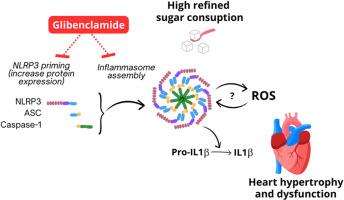Glibenclamide reverses cardiac damage and NLRP3 inflammasome activation associated with a high refined sugar diet
IF 4.2
3区 医学
Q1 PHARMACOLOGY & PHARMACY
引用次数: 0
Abstract
Increased energy intake from carbohydrates has been associated with major cardiovascular outcomes. Mice fed a highly-refined carbohydrate (HC) diet develop cardiac hypertrophy and inflammation. During cardiac injury, NLRP3 inflammasome is activated which results in a local inflammatory response. In this study, we hypothesized that a nom-hypoglycemic dose of glibenclamide may reverses sugar diet-induced cardiac damage by NRLP3 inflammasome inhibition. Mice were fed the HC diet for eight weeks and divided into a group treated with glibenclamide (20 mg/kg, gavage) and another with vehicle for four weeks. Afterward, hearts were excised for morphometric analysis and ex vivo function determination. NLRP3 inflammasome activation was investigated by western blotting and in situ fluorescent detection of reactive oxygen species (ROS) and active caspase-1. The HC diet promotes heart hypertrophy and collagen deposition, which were reverted by glibenclamide without ameliorating HC diet-induced insulin resistance. Changes in cardiac performance were observed in vivo by invasive catheterization and in Langendorff-perfused hearts due to the HC diet, which were prevented by glibenclamide. Hearts from HC diet mice had increased levels of NLRP3 and cleaved IL-1β. Glibenclamide reversed ROS production and caspase-1 activity induced by HC diet. These findings suggest glibenclamide's cardioprotective effects on heart damage caused by the HC diet are related to its inhibitory action on the NLRP3 inflammasome.

格列本脲可逆转与高精制糖饮食相关的心脏损伤和NLRP3炎性体激活。
从碳水化合物中摄入的能量增加与心血管的主要后果有关。喂食高精碳水化合物(HC)的小鼠会出现心脏肥大和炎症。在心脏损伤过程中,NLRP3 炎性体被激活,导致局部炎症反应。在这项研究中,我们假设格列本脲的名义降糖剂量可通过抑制 NRLP3 炎性体逆转糖饮食引起的心脏损伤。给小鼠喂食高血糖饮食八周,将其分为格列本脲治疗组(20 毫克/千克,灌胃)和给药治疗组各四周。之后,切除心脏进行形态计量分析和体内外功能测定。通过Western印迹和原位荧光检测活性氧(ROS)和活性Caspase-1来研究NLRP3炎症小体的激活情况。HC饮食可促进心脏肥大和胶原沉积,格列本脲可逆转HC饮食引起的心脏肥大和胶原沉积,但不能改善HC饮食引起的胰岛素抵抗。通过有创导管术和朗根多夫灌注心脏,观察到HC饮食导致的体内心脏性能变化,格列本脲可阻止这些变化。HC饮食小鼠心脏中的NLRP3和裂解IL-1β水平升高。格列本脲逆转了高氯饮食诱导的 ROS 生成和 caspase-1 活性。这些研究结果表明,格列本脲对高密度脂蛋白饮食引起的心脏损伤的心脏保护作用与其对NLRP3炎性体的抑制作用有关。
本文章由计算机程序翻译,如有差异,请以英文原文为准。
求助全文
约1分钟内获得全文
求助全文
来源期刊
CiteScore
9.00
自引率
0.00%
发文量
572
审稿时长
34 days
期刊介绍:
The European Journal of Pharmacology publishes research papers covering all aspects of experimental pharmacology with focus on the mechanism of action of structurally identified compounds affecting biological systems.
The scope includes:
Behavioural pharmacology
Neuropharmacology and analgesia
Cardiovascular pharmacology
Pulmonary, gastrointestinal and urogenital pharmacology
Endocrine pharmacology
Immunopharmacology and inflammation
Molecular and cellular pharmacology
Regenerative pharmacology
Biologicals and biotherapeutics
Translational pharmacology
Nutriceutical pharmacology.

 求助内容:
求助内容: 应助结果提醒方式:
应助结果提醒方式:


